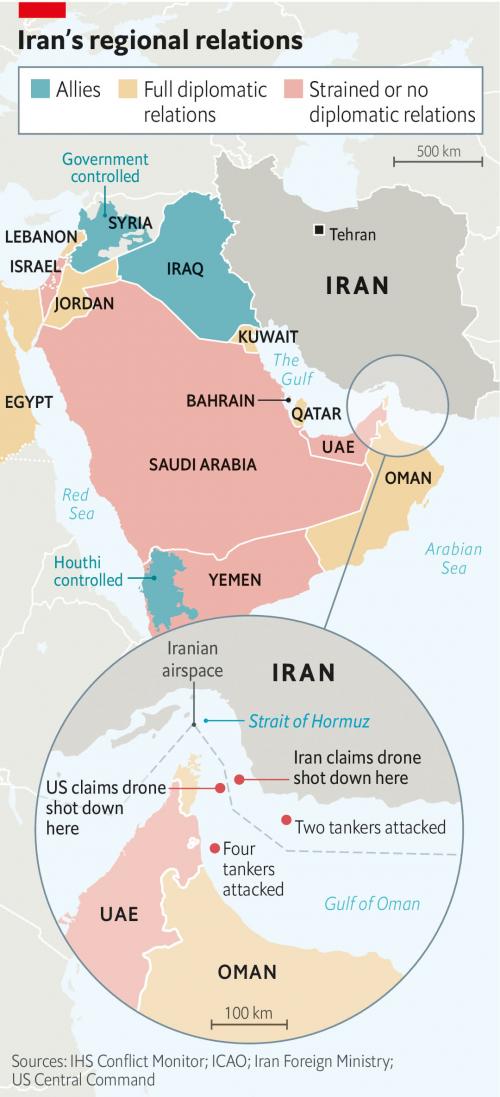Market Action
Global equities were slightly lower on the week, with markets awaiting news from the ongoing G20 summit in Japan. Yields on the US 10-year Treasury note dipped 6 basis points to 2.00%, compared with last Friday, while the price of a barrel of West Texas Intermediate crude oil added $2 to $59.40 amid tensions in the Persian Gulf. Volatility, as measured by the Chicago Board Options Exchange Volatility Index (VIX), rose to 16 from 14.7.
US President Donald Trump and Chinese President Xi Jinping are expected to meet on Saturday on the sidelines of the G20 summit in Osaka, Japan. Observers put very low odds on a comprehensive trade agreement being struck at the meeting, but they put a fairly high probability on the two sides agreeing to resume talks. If China returns to the bargaining table, Trump is expected to hold off on imposing additional tariffs on the remaining $300 billion in imports from China that are not yet subject to levies. Trump also stated this week that he expects very big trade deals with Japan and India.
Czechs on Sunday held their largest protest since the fall of Communism — and the second major demonstration this month — as hundreds of thousands gathered on a hilltop overlooking the capital demanding the resignation of Prime Minister Andrej Babis. He is currently facing a criminal investigation on fraud charges that carry up to 10 years in jail and has recently appointed a new justice minister, who protesters worry will bury the case. At stake is a major governance issue facing this corner of Europe, over how much power freely elected leaders should have to weaken the independent institutions that constrain them.
Turkey’s ruling AK Party lost control of Istanbul after a re-run of the city’s mayoral election, delivering a stinging blow to President Erdogan. The original victory in March was annulled after the AKP alleged irregularities. The result ends 25 years of AKP rule in Istanbul.
Economic sentiment in the eurozone deteriorated in June, falling to its lowest level since 2016. Most of the decline was concentrated in the industrial sector, owing to weak exports.
Ethiopia’s government foiled a coup attempt last Saturday in which several senior government officials were killed including the army chief of staff. The coup attempt underlines the deep challenges facing Prime Minister Abiy Ahmed as he launches sweeping reforms in what has been one of the world’s most entrenched one-party systems.
Eighteen big banks, subject to Fed oversight, passed their stress tests and had their plans to increase shareholder payouts approved. Several immediately increased dividends and stock buybacks after the announcement. Phase one of the test, released the previous week, showed that the US banking industry would lose a total of $410 billion in the event of a severe recession, resulting in double-digit unemployment and a nearly 50% decline in US equities.
The EU and South American economic bloc Mercosur (Argentina, Brazil, Uruguay and Paraguay) clinched a deal Friday that would create a trade bloc of 780 million people, representing a quarter of the world’s economy. The pact, which caps 20 years of often contentious negotiations, represents a victory for EU leaders who have been defending free trade against a tide of anti-globalization. It also is a win for the conservative presidents of Brazil and Argentina, who have been struggling to open two of Latin America’s most closed economies.
What Could Affect the Markets in the Days Ahead
As Q2 earnings season approaches, analysts are forecasting a second straight decline in S&P 500 earnings per share. Q1 earnings contracted 0.6%, and analysts have projected a 2.6% decline in Q2. That would be the first back-to-back decline since late 2015 through early 2016. Downward revisions are especially prevalent among US-based multinationals, given the headwinds and supply chain disruptions stemming from the trade conflict.
The EU has threatened to impose sanctions on Turkey if it continues “illegal drilling” in waters near Cyprus in the eastern Mediterranean. Reuters news agency reported that a Turkish drilling ship, the Fatih, had been anchored west of Cyprus since early May and had begun drilling. Turkey said it was drilling inside its continental shelf, complying with international law. Last week, Turkey launched a second drilling ship for natural gas and oil prospecting off the northeast coast of Cyprus. Of course, the US is watching the situation given that Turkey – a NATO member – committed to buy the Russian S-400 missiles, which if it happens could be the beginning of the unraveling of a number of significant geopolitical developments in the region.
US President Trump has announced additional sanctions against Iran. Part of the US strategy is to drive Iran’s oil exports to zero. India, a major consumer of Iranian crude, announced that it has halted imports from Iran and that it will look to the US and to Saudi Arabia to fill any supply gaps. While increasing economic pressure on Tehran, the US also reiterated it is willing to negotiate with the Islamic Republic, a call that so far has gone unheeded.
This Week from BlackSummit
Cryptocurrencies and Pseudocurrencies Meet Homer: The Tale of New Wine in Old Wineskins Continues
John E. Charalambakis
Recommended Reads
Turkey makes case to Congress to drop S-400 sanctions
Trump-Xi Summit at G-20 Could Save the World $1.2 Trillion
As Pompeo heads to Delhi, the US-India relationship is at a critical juncture
More than half of the world’s poor are children
Video of the Week
Cyprus: Offshore exploration raising fears of a confrontation

